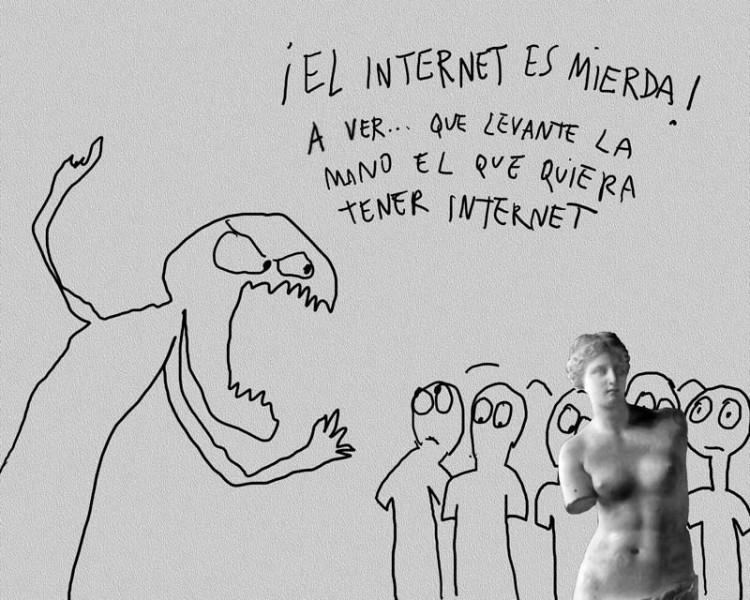
“The Internet is shit! Let's see… whoever wants Internet, raise your hand.” Cartoon by Lázaro Saavedra, reproduced with permission.
Global Voices Advocacy's Netizen Report offers an international snapshot of challenges, victories, and emerging trends in Internet rights around the world.
Journalists in Cuba have evidence that the Cuban government is monitoring and selectively blocking mobile SMS messages based on keywords such as “human rights”, “hunger strike”, “plebiscite” and “state security”. According to a report by journalists Yoani Sánchez and Reinaldo Escobar, who run the Havana-based media outlet 14ymedio, text messages containing a range of sensitive keywords along with the names of various high-profile anti-Castro activists, are not reaching their destinations. However, the messages still appear as ‘sent’ on the sender’s telephone.
According to technologist and opposition blogger Eliécer Avila, at least 30 keywords have been identified as triggers for the blocking mechanism. It is not clear how long this has been in place. The journalists have not yet shared a full list of terms tested, nor did they indicate whether they believe the blocking targets specific users. Sánchez, Escobar and Avila are all very high-profile opposition voices.
The discovery comes at a moment in which Cuban bloggers and independent journalists are facing increasing scrutiny and, in some cases, public condemnation, by leading government and Cuban communist party officials. Diario de Cuba writer Maykel González Vivero, who is also a vocal advocate for LGBT rights on the island, was fired from his job with state radio station Radio Sagua two weeks ago, for collaborating with “private media”. In late August, the well-established Uruguayan blogger and former BBC journalist Fernando Ravsberg, who has lived in Cuba since the mid-1990s and has a family there, was publicly condemned on television by the vice president of Cuba’s Press Workers’ Union, charged with offending the sentiments of “decent Cubans.”
Russian authorities jail gamer for offending religious people, Pokemon-style
Ruslan Sokolovsky has been in jail since early August for playing Pokemon Go inside a Russian Orthodox cathedral.The 21-year-old video blogger remains imprisoned while police investigate him for committing extremism, offending religious people and “violating the right to religion in a house of worship.” If convicted on those charges, Sokolovsky could go to prison for up to five years. The video (now with English subtitles) has garnered more than 1.3 million views on YouTube.
On September 7, Sokolovsky complained that a prison psychiatrist had threatened his life, warning that he could be institutionalized “where they don't let the lawyers in.” Investigators have also revealed that they discovered a camera-pen at his home—technology that is illegal in Russia. The media is describing the device as a “spy pen,” complementing allegations by pro-government bloggers that Sokolovsky's atheist activism online and in the media is part of a larger, coordinated campaign by nefarious forces designed to weaken Russia's traditional values.
Algerian court upholds activist conviction over Charlie Hebdo link
An Algerian appeals court upheld the conviction of activist Slimane Bouhafs, decreasing his jail sentence from five to three years. Bouhafs originally was sentenced to five years in jail and a fine of 100,000 Algerian dinars for “offending the Prophet” and “denigrating the creed and precepts of Islam” for linking to a cartoon by the French satirical magazine Charlie Hebdo depicting the Prophet Muhammad crying.
Web journalist arrested in Venezuela
Chilean-Venezuelan journalist and lawyer Braulio Jatar is being held by Venezuelan authorities on charges of money laundering. Jatar, who is the director of the investigative news site Reporte Confidencial, was detained during a protest in the locality of Villa Rosa that forced President Nicolas Maduro to leave the city. Jatar’s supporters believe his coverage of the protest are the real reason he is in custody.
Turkey Crackdown Chronicle
Turkish journalist Özgür Öğret has been working with the Committee to Protect Journalists to produce a weekly report called the “Turkey Crackdown Chronicle,” describing ongoing government threats against digital and traditional journalists reporting on politics, violence and corruption in Turkey. Read this week’s installment here.
Narendra Modi’s ‘Digital India’ does not include Kashmir
The Indian government, which champions internet access as a basic human right, is blocking mobile internet in Kashmir. The government shut down mobile internet about two months ago, when protests erupted following the killing of a separatist militant leader by the Indian military in early July. The shutdown of the mobile internet network leaves most Kashmiris, who rely on mobile internet to access the web, “anxious and isolated”, writes journalist Hasit Shah: “It is difficult for journalists to report on what is happening. Vital information is missing. Kashmiris in India have been transported back to a pre-digital era.”
Saudi Arabia bans LINE messaging app
The Saudi government added LINE to the long list of VoIP services and messaging apps blocked in the country, which includes Viber, WhatsApp, Facebook Messenger, Telegram and Skype. Responding to the block, Saudi users took to Twitter to protest the government’s strict Internet censorship policies, asking “what’s the point of having Internet?”
Surprise, surprise: New Snowden leaks reveal more mind-blowing surveillance tools
The Intercept released new documents from the Snowden leaks that reveal how the NSA aided “‘a significant number of capture-kill operations’ across the Middle East and North Africa, fueled by powerful eavesdropping technology that can harvest data from more than 300 million emails and phone calls a day.”
New Research
- High Impact Questions and Opportunities for Online Harassment Research and Action – Nate Matias, MIT Center for Civic Media
- The Biggest Lie on the Internet: Ignoring the Privacy Policies and Terms of Service Policies of Social Networking Services – Jonathan Obar and Anne Oeldorf-Hirsch
- Online tracking: A 1-million-site measurement and analysis Draft: July 11th, 2016 – Steven Englehardt and Arvind Narayanan
Subscribe to the Netizen Report by email
Afef Abrougui, Ellery Roberts Biddle, Weiping Li, James Losey and Sarah Myers West contributed to this report.
Read Full Story from Global Voices Advocacy https://advox.globalvoices.org/2016/09/15/netizen-report-in-cuba-text-messages-with-controversial-content-are-disappearing/
This article by Netizen Report Team originally appeared on advocacy.globalvoicesonline.org on September 15, 2016 at 07:24PM